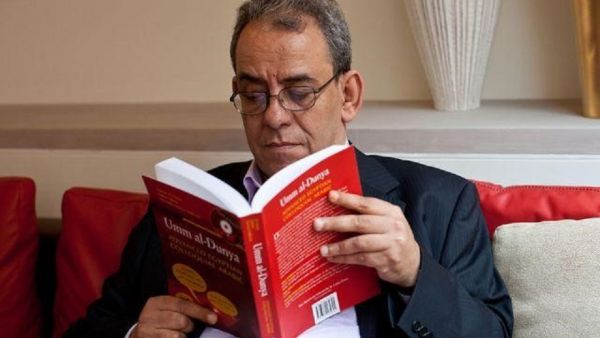Georgetown Professor Who Revolutionized Arabic Instruction Retires After 12 Years of Service

After a 12 year tenure at Georgetown University in Qatar, Senior Language Instructor Abbas Al-Tonsi will retire home to Cairo, Egypt this year, leaving behind an innovative and thriving Arabic program tailored to the needs of Arab students.
Abbas Al-Tonsi came to GU-Q in 2007, already the co-author of some of the most globally recognized Arabic-language text books for non-native speakers. At the time he had little idea that he would soon be developing a whole new system of teaching Arabic to Arab students.
When the Doha campus opened in 2005, it offered the same Arabic courses as those offered at the main campus in Washington, DC. However, Al-Tonsi quickly realized that many enrolled Arab students attended foreign international schools and think in English, having to translate their thoughts in order to speak Arabic. In addition, while they may speak a dialect of the language, they cannot use professional-grade Modern Standard Arabic, or MSA. Furthermore, many of their teachers were specifically trained in teaching non-native speakers.
Recognizing the need for a whole new approach to teaching and learning tailored to heritage Arabic speakers, Al-Tonsi worked with his colleagues to transform the curriculum, developing a separate learning track called the Heritage Learners Program—a groundbreaking Arabic language initiative that includes lessons in Arabic culture and the arts, and addresses the unique native speaking profile of many Arabic language students in Qatar.
According to Al-Tonsi, the gaps addressed by the Georgetown curriculum also plague Arab education across the Arab world. “In the past, members of educated society have been able to speak and extemporize fluently in MSA. But now lawyers speak using the colloquial and judges make mistakes in the MSA when reading the texts of rulings.” Because of a dependence on curricula from the West, he says, “all of us, to a varying degree, are heritage learners. Most of us think in dialects and then translate into MSA.”
Dr. Yehia Mohamed, Associate Professor of Arabic at GU-Q, worked on the project with Al-Tonsi from the beginning. “During his leadership the [Heritage Learner’s] program has expanded to become one of the most important Arabic education programs in the region and the world.”
It is praise repeated by everyone who worked with him. “I was honored to be a member of the selection committee that appointed him to GU-Q in 2007. We are proud to have had him lay down solid foundations of such a notable educational program,” says the dean of GU-Q, Dr. Ahmed Dalal.
According to Dr. Gerd Nonneman, professor of International Relations and Gulf Studies, and a former dean of GU-Q, Al-Tonsi will be remembered as the lead in GU-Q’s “creation of the world’s leading team researching and developing pedagogy for Arabic heritage learners.”
As he said goodbye to the university, and the Doha community he called home, Al-Tonsi reminisced with some pride about how much has changed under his tenure. “Today, there is no other place that offers the study of Arabic for heritage learners consistently, as part of the standard course offering each semester. We started with only two professors and now we are at nine. We started with one class and now we have multiple classes focused on content for advanced levels, conversational speech, literature, culture, cinema, and linguistics.”
In retirement, Al-Tonsi plans to continue working on the Arabic textbooks used in classrooms all over the world. “Abbas is a treasure of Arabic language instruction. He still has so much to offer, and I am sure that his intellectual production will continue and will benefit future generations,” says Dr. Hana Zabarah, assistant professor of Arabic at GU-Q.
The lasting legacy of Al-Tonsi’s ability to meet the changing needs of Arabic learners will continue to bear fruit as future generations go on to work in and build institutions on a solid foundation of Modern Standard Arabic, ensuring the preservation of the Arabic language for Qatar and the region.
Background Information
Georgetown University in Qatar
Established in 1789 in Washington, DC, Georgetown University is one of the world’s leading academic and research institutions. Georgetown University in Qatar (GU-Q), founded in 2005 in partnership with Qatar Foundation, seeks to build upon the world-class reputation of the university through education, research, and service. Inspired by the university’s mission of promoting intellectual, ethical, and spiritual understanding, GU-Q aims to advance knowledge and provide students and the community with a holistic educational experience that produces global citizens committed to the service of humankind.
Located in Doha’s Education City, GU-Q offers the same internationally recognized Bachelor of Science in Foreign Service degree as Georgetown’s Capitol Campus in Washington, DC. This unique, interdisciplinary program prepares students to tackle the most important and pressing global issues by helping them develop critical thinking, analytic, and communication skills within an international context. GU-Q alumni work in leading local and international organizations across industries ranging from finance to energy, education, and media. The Qatar campus also serves as a residency and delivery location for the Executive Master’s in Emergency and Disaster Management along with the Executive Master’s in Leadership.






